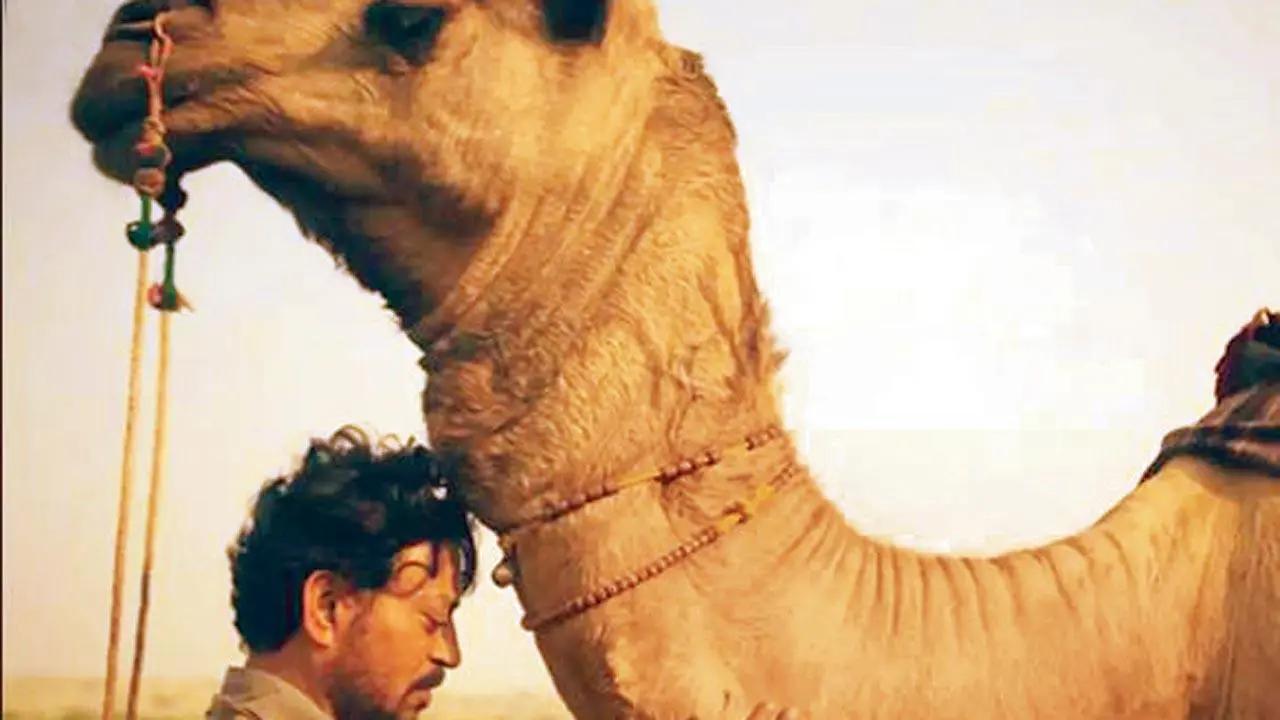This is late Irrfan’s final film to release in Indian theatres

Still from the movie
Movie name: The Song of Scorpions
Director: Anup Singh
Actors: Irrfan, Golshifteh Farahani
ADVERTISEMENT
The rating in this review is missing. As is the film’s beyond-beloved star. In a way that the latter makes the former redundant. This is late Irrfan’s final film to release in Indian theatres.
And you might wanna go all the way—only to watch the performer on a wide canvas of his own choice; a wholly art-house picture, he would’ve picked, perhaps, for a personal exploration. Rather than usual pitfalls, that is, fame, money, etc. That itself is rare for an actor. Irrfan, one needn’t emphasise, was the rarest.
Therefore, you catch him, all the more casually emote with his eyes; or deliver that slightly unexpected grin/smile; a line, thrown away, with such swag, that it’ll sound LOL funny, even when it’s not. Beyond all of the obvious above, you observe him soaking in a moment, over long passages of silence, going with the flow or wind. As against acting, per se.
It’s this experiencing emotional truth, as it were, that Irrfan’s co-actor, Rasika Dugal, told me she once felt with him, during Anup Singh’s Qissa (2013). If I’m not mistaken, he nodded at her, knowingly. Suggesting it is what it is—a very internal, almost mediative moment. Whether or not audiences always notice is another matter.
The Song of Scorpions is the Europe-based Singh’s second and final international production, with Irrfan, and his third feature—Ekti Nodir Naam (2002), an ode to Ritwik Ghatak, being his directorial debut. For all the imageries, allegories, metaphor—foremost, these are films that draw you in deeply with visuals first, and expect you to interact and simmer within the terrain/spaces viscerally, all through.
There are anyway few vistas as stunning as the vast sand-dunes, baking under hot sun, merging with the horizon, isn’t it? Even though dunes are a relatively rare feature in Thar desert—something that disappoints you, I guess, when you first set foot in Rajasthan; as a child, assuming there will only be stretches of golden sands for as long as the eyes can see.
That doesn’t stop a film from recreating that dream, for a drama, off Jaisalmer—must be Sam or Khuri, I suspect. You see a peculiarly timeless village of tribals, mostly women, living with nature, without taming it. White scorpions crawl all over here, stinging humans, because that’s in their fitrat (character).
The way humans heal themselves is through a song! There is an old woman (Waheeda Rehman), especially blessed with these seemingly magical powers. Her grand-daughter, the film’s female lead, is also her mentee, taking the sting off scorpions’ bites.
What if this young girl is stung by a human herself. That’s at the core of this lyrical tragedy. It is entirely her story—while you may have walked into the theatre for Irrfan. He plays a camel trader, instantly awestruck by the beauty of this woman, who seemingly spurs his advances.
Iranian actor, in exile, the gorgeous Golshifteh Farahani, is the leading lady— shedding herself almost entirely, including naturally Persian intonation, as much as she can, to speak in a hardcore Rajasthani dialect.
Frankly, you can wrap this picture’s story into a single sentence. But this is the sort of film that relies more on treatment and world-building, as opposed to characters (with back-stories), or plot (that constantly moves forward). Making it a pic that if it’s not part of your palette—or you find it hard to buy into—you will rightly assume it to be self-indulgent or pretentious.
But that’s the leap of personal expression/imagination, playing with form and narrative, that Irrfan was fearlessly willing to back. He was, in that sense, more than simply an actor.
It’s only after his death I figured from anecdotes how he would actively seek out even untested talents—whether writer Varun Grover for a K Asif biopic, or comedian Gursimran Khamba, that he was shooting a political series (Gormint) with.
This film’s director Singh, once an assistant to Mani Kaul, rightly sheds a light on this generously collaborative/facilitative aspect of Irrfan, in his book, Irrfan: Dialogues with the Wind, that I skimmed through after this film. The Song of Scorpions premièred at Locarno film festival in 2017.
This is before Irrfan was detected with a rare type of cancer. Sure, his slow death sent admirers/fans into collective shock and grief—more than age, for the stage in his career he was at; right at the cusp of global greatness. It also unwittingly brought him the widest halo that no mortal can plan.
The Songs of Scorpions—that opened on his third death anniversary—could also be a full circle of sorts, since a raw Irrfan, in the hot, rugged Rajasthan deserts, is how the wider world first experienced him, in Asif Kapadia’s international production, The Warrior (2001). Which offered him, in turn, a better career in India, after western appreciation, first. He’d been around in Bombay for years before that!
Irrfan’s actor-son Babil was there at a special screening of his father’s last release, where I saw it. He said (probably his father’s words) that if you devote yourself adequately to art, it ensures you transcend life, indeed death, itself.
As it is, I feel films like The Song of Scorpions belong more to galleries/museums. With Irrfan, it’s all the more an important artefact; a collectible installation.
 Subscribe today by clicking the link and stay updated with the latest news!" Click here!
Subscribe today by clicking the link and stay updated with the latest news!" Click here!







